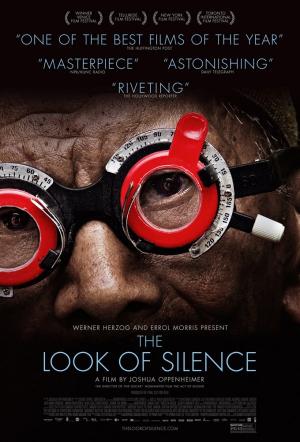The Look of Silence, Joshua Oppenheimer's second film stemming from his decade long research, has only one flaw: it was released as the second part of this diptych. When The Act of Killing came out in 2012, the magnitude of what Oppenheimer had done - along with Christine Cynn and an anonymous Indonesian credited as co-directors - shook the festival circuit (and beyond), this earthquake resulting in the film being one of the most rewarded documentaries ever made (awards are not always indicative of a films' quality, but they do show its capacity to travel and make an impact). Naturally, everybody expected the second part of the series to be equally provocative. From this point of view only, The Look of Silence, a more or less straightforward observational documentary, might seem a bit disappointing, a bit dull.
The film follows Adi as he tries - against the wishes of his family and the reluctance and casual threats of the perpetrators and those in power backing them up - to find the truth about the death of his brother Ramli and, more importantly, to confront the killers. Adi is also a sort of a traveling eye doctor, roaming the villages making standard prescription glasses for old people, a job that has a beautiful resonance with his assumed mission: making people see the gruesome past and acknowledge it as real. Some of these old people are responsible for the killings, some others, like his own uncle - who was the chief guard at the prison were Ramli was held -, responsible for looking away (or maybe looking in silence); in other words, responsible for being irresponsible. Adi seems to be the only one that doesn't want to look away, or in silence, as his mother advises, hoping to get her revenge in the afterlife which the killers, now old and gray and senile, will soon have to face. Her way of dealing with things is not dissimilar to that of Anwar Congo in the The Act of Killing. Anwar's biggest problem is to make peace with the people he's killed so there won't be any bad karma for him after he dies (that is not to say he doesn't feel regret). But this is not only some sort of ancient local wisdom, it is the expression of the way things stand presently in Indonesia: the killings of 1965-1966, when not ignored altogether, are presented as a necessary act of courage and patriotism, and the people behind them have risen to power and wealth, and are respected (feared) members of their community. So, Adi's mother is in fact quite a pragmatic: "be careful" she tells her son, "maybe they'll poison you. You should go to the meetings with a switchblade, or maybe a club wrapped in a newspaper."
Adi's journey is in fact a three-way path. We see him meeting the killers and their families, an attempt to deal with the past. At other times we see him comforting his old mother so she can deal with the present - her grief, while it comes from the past, is ongoing. Adi is also on a mission for the future, he's constantly trying to educate his young son, talking him through the state sponsored propaganda that is being taught in school, taking him to see the site of the mass killings. This kind of education may seem a bit too much to put on the shoulders of such a young boy, but Oppenheimer also gets access to one of the boy's history lesson, where we see him and others of his age, being indoctrinated. The class scene features a very funny moment when the teacher is spelling the first part of a word, and the pupils all recite the ending: "Demo-" he says at one point, when describing the current status quo in Indonesia (and a result of the heroic struggle against the communists), and the pupils finish "-cracy" - and this is how democracy is taught and learnt. If Adi's boy is not too young for the regime, he's not too young for home schooling either.
There is also a fourth, more inward path. These are the moments when Adi, who is always on a road, a wanderer by trade and conscience, sits alone in his chair in front of the TV, watching Joshua Oppenheimer's interviews with the regime's thugs. This is his look of silence, the one situation were he's not trying to convince anybody that the past must not stay buried.
